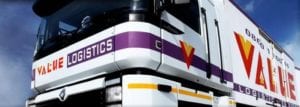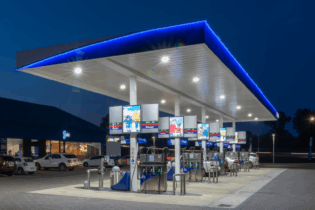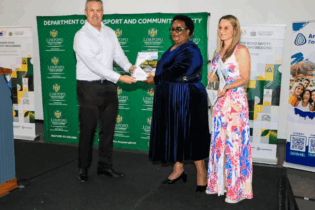Transport World Africa toured Value Logistics Tunney warehouse in Johannesburg and Simon Foulds walked away with the knowledge of how the company is able to move 80 000 parcels per day during peak periods through the facility and 55 000 parcels in off-peak times.
In today’s volatile market, companies’ successes are dependent on a robust distribution channel that is able to provide a framework to deliver their goods effectively. The Value Group was born from Value Truck Rental, founded in 1981 by Group CEO, Steven Gottschalk with one vehicle and listed on the JSE, (Transport Sector) in 1998. The company has grown from strength to strength, starting with the purchase of Freightpak, on the 1st March 1999, followed by the acquisition of Rent-a-Bakkie in late 2000. During 2001, Fleetrent and Fridge Fleet were acquired and 4PL solutions have been offered since. Positioning itself as a leader in its field through expanding its services from basic truck rental to fully outsourced supply chain solutions that include customised door-to-door offerings via road, air and sea, the company understands their customers’ requirements. Warehouse The Tunney facility is approximately 100 000 SQM under roof catering for between 55 000 and 80 000 parcels moving through the warehouse daily. At this particular warehouse consumer electronics, FMCG, retail , furniture and general freight is accommodated. What makes this facility a unique operation is that it has been designed in such a way that it allows for the integration of warehouse, cross dock and transport operations. This allows for the economies of scale to be achieved through optimal consolidation opportunities. The facility is sustainable and allows for the growth of existing customers as well as for new client take-on, leveraging on flexibility and standardisation of infrastructure procedures and capacity for growth. It was designed in order to save on electricity costs without compromising operations. This was achieved through the use of natural lighting by installing sky lights in the warehouse roof and it was also designed with a natural ventilation system which automatically ventilates the building without any electricity. The design is based on the insight gained by CEO Steven Gottschalk, divisional director Jattie van Wyk and senior analyst Dirk Bruwer when visiting similar facilities operating in England, Germany, France, the Netherlands and Belgium. Through the ideas generated by visiting these European facilities and working with designers Les Greening and Associates, the Tunney facility was designed and built into what is a world class multi-principle warehouse. Operating a multi-principle warehouse means that Value provides warehousing to several different principal customers all within the same premises. Being a third party logistics provider, the company specialise in catering for the specific business requirements of multiple customers. Through leveraging from standardised logistics activities, best practises and infrastructure the company is able to provide its customers with the most efficient service. Another interesting aspect of the Tunney operation is it has also been designed in such a way that it is easy to change the interior configuration of the warehouse to accommodate different stock or to utilise the warehouse to its maximum capacity. Ensuring good management control of all goods moving through the warehouse is managed by the Warehouse Management System (WMS) and Distribution Management System which is used as management tools throughout the facility to track stock and ensure inventory management best practises are carried out on a day to day basis. Standard operating procedures are formally documented to ensure that the procedures are followed and managed accordingly. The warehouse can accommodate over 150 vehicles simultaneously. All vehicles are fitted with tracking systems and are monitored and tracked continuously through Value’s internal tracking department. Dedicated controllers monitor specific routes within a live system which allows for the identification of any deviations from routes, speeding and emergencies. Key to the successful growth of the company is ensuring all stock is delivered on time, within the time schedule to the correct destination. Value achieves this by agreeing to lead times and KPIs with each client and the process is then managed through the WMS and distribution management system ensuring that all stock is picked and dispatched on the right day and is delivered according to the lead time agreed upon with each client. Master data is well maintained and mapped into the systems to ensure that all delivery points are continuously updated according to each client’s changing customer base. The operating fleet at this facility is flexible and fleet configuration is changed daily subject to specific requirements and peak periods, ensuring a lean operation always able to meet clients volumes. Vehicles for the logistics division are pulled from the truck rental operation offering in excess of 4 800 vehicles including forklifts. Vehicles are used for local, cross-border, regional distribution centre deliveries and inbound collections from customers. Ensuring its trucks do not return empty therefore getting greater efficiency out of truck operations vehicles returning from deliveries will collect stock from customers in the afternoon returning to Tunney with the stock to be cross docked. Vehicles will also perform as many drops as possible per route and it is for this reason that some vehicles may return empty from time to time, however the distance from the last drop to the facility is generally negligible due to the efficient distribution planning of each route. Linear Programming models are used in order to optimise the routing of vehicles. The training and wellbeing of drivers is very important to Value. The company has its own driver training academy responsible for the training and monitoring of all its drivers. Drivers are continuously monitored receiving on-going training related to customer service, fatigue management, AARTO, speeding and all key aspects of being a responsible and more efficient driver. All drivers are tested on an annual basis ensuring their knowledge and driving skills are up to standard. Operational training is carried out with the staff ensuring that standard operating procedures are understood across all levels. The importance of this facility in Tunney for Value is due to the fact that it performs deliveries to customers in the following areas:o Johannesburg
o Vaal and surrounding areas o West Rand o Pretoria o Brits o East Rand o Regional Areas: Mpumalanga, as far as Middelburg, Free State, as far as Virginia, Limpopo as far as Elissrus North West, as far as Carletonville The facility also acts as a hub for the transfer of stock on a national basis to the following regional Value hubs: o Durban o Cape Town o Port Elizabeth o East London o Polokwane o Nelspruit o Bloemfontein o Harrismith o Klerksdorp o George o Windhoek






